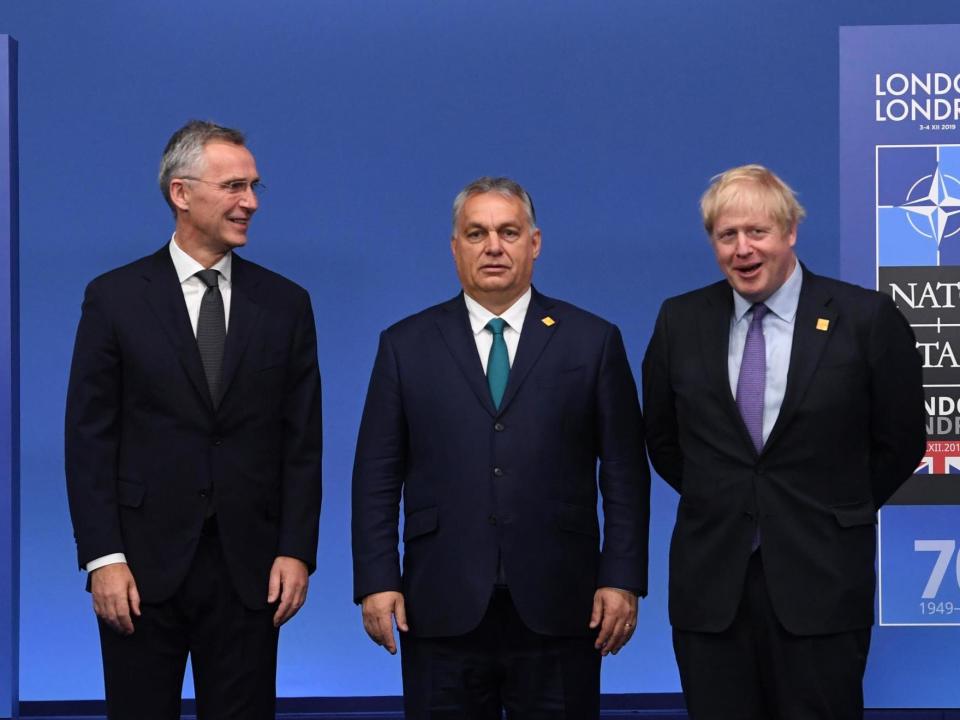Viktor Orban may have won over right-wing British politicians – but we’re not Hungary 2.0 just yet

Boris Johnson revels in his project to build a new kind of conservatism, spending just as much time in the election campaign distancing himself from his own party as from the opposition. One of the great mysteries of his premiership is the extent to which his hard-wired social and economic liberalism will triumph over the communitarian and protectionist compulsions of many of the new voters who brought returned him to office.
The swift reaction this week from No 10 to the revelation that a senior advisor, Tim Montgomerie, had emphasised a spiritual connection between Johnson’s leadership and Viktor Orbán’s right-wing populist government in Hungary suggests that, at least for now, liberalism remains the public line.
The relationship between the Conservative Party and the Hungarian government has been under scrutiny since the bizarre decision of Conservative MEPs in Brussels to defy their counterparts on the centre-right and vote against a motion to activate the Article 7 process against Hungary, which seeks to challenge the country’s slide into illiberalism.
Since then, Johnson and his government have been keen to emphasise that their "Global Britain" plans will be steeped liberal values, defending media freedoms, global trade and protecting women’s rights.
Yet, the proposals set out in their winning manifesto for a Democracy Commission, and particularly its scope to address the relationship between the executive and the courts, has unsettled – encouraging Lady Hale, the outgoing Supreme Court president, to warn against Britain adopting a more politicised judiciary.
It is true that Johnson, like Corbyn, ran a populist campaign – pitting "the people" against their parliament – and that populism is a dangerous and slippery slope towards polarisation and the erosion of trust. It is also the case that many of comparisons that have been made between a dysfunctional British political system grappling with the enormity of Brexit and the rise of genuine right-wing populist parties in Europe have been lazy.
Orbán holds a particular fascination to those wrestling with the notion of a post-liberal Europe. Afforded special status as one of a handful of truly "intellectual" leaders, his trajectory from liberal dissident to the architect of Europe’s most troublesome illiberal democracy both repels and entices.
His strategic approach to democratic transformation is now the textbook example of how to wield the office of state to its full capacity – systematically bringing courts, the media, universities, and the entire democratic process under his control.
Like Putin in Russia, and Kaczyński in Poland, Orbán understands that the semblance opposition can be helpful for maintaining a degree of democratic legitimacy. Flagrant corruption means he hands plum jobs running media companies to his loyal friends, but Hungarians can continue to access to a smattering of contrarian local news sources. And while they face an uphill battle to raise funds and gain footholds, opposition parties are often able to put in a good fight.
His dramatic political agenda touches all points of life in Hungary, and focuses not only on democratic change but also deep social engineering. Migration is positioned as an existential threat to Hungary’s Christian culture, history is rewritten to minimise the country’s role in the Holocaust, and Jewish philanthropist George Soros and the university he founded hounded out of the country.
One of the most concerning aspects of Montgomerie’s comments on Hungary was his support for its "family policies" – a series of welfare payments and incentives regarded as both a transactional form of voter bribery and a stealth effort to roll back women’s freedoms by embedding their value in their capacity to bear children. With Hungary’s population in long-term decline and emigration rife, Orbán believes encouraging women to produce "home-grown" children can reinstate the traditional family values lost in their emancipation, and also counter the need for migrant workers.
The EU has watched Hungary’s transformation with a growing sense of horror, each new transgression a nail in the coffin of its dreams for democratic renewal after the fall of communism in 1989. Orbán, once himself a revolutionary activist, appears to embody the failure of the liberal project.
The rise of populism and the growing volatility amongst voters have made clear that traditional politicians in western democracies need to reflect on the substance of the social, economic and political settlement that emerged in the age of globalisation. It is healthy for us to question the consequences of this transformative period on national culture, community and belonging and imagine how our fragile societies can be strengthened.
We are about to walk away from the European Union, and if there is indeed a dividend to this moment, it is the opportunity we have to consider not just what we can learn, but what we can teach the world. Despite our recent troubles, we remain a robust democracy, with a strong foundation of liberalism at our heart. Let us be the light on the hill.
Sophia Gaston is the director of the British Foreign Policy Group
Read more
UK government to have 'special relationship' with Orban, says aid

 Yahoo News
Yahoo News 